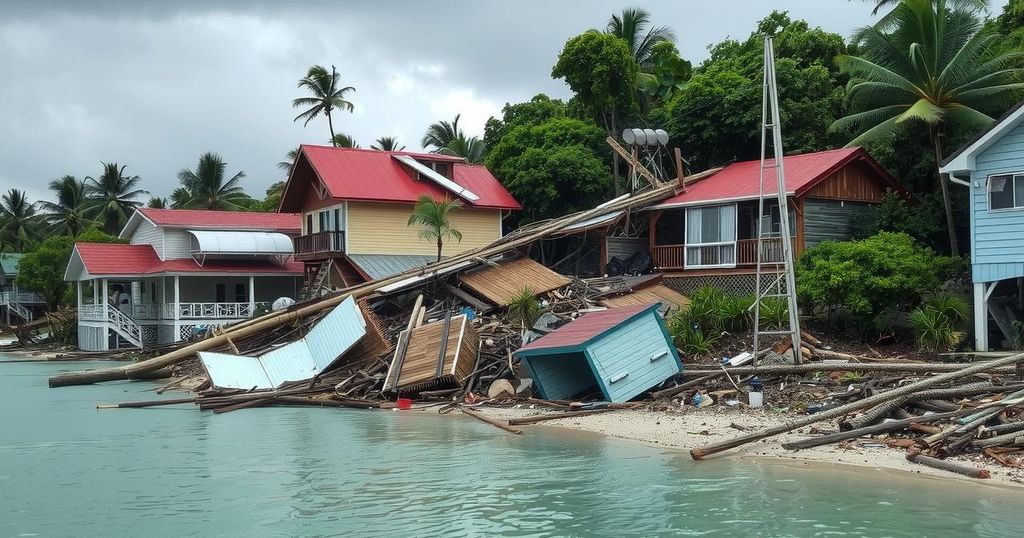Devastating Impact of Cyclone Chido on Mayotte: Rising Death Toll and Destruction

Cyclone Chido has inflicted severe damage in Mayotte, causing initial reports of 11 to 14 deaths and numerous injuries. Rescue operations face challenges due to infrastructural damage as more than 15,000 homes lack electricity. International aid, including support from UNICEF, is mobilizing for recovery efforts amidst concerns about the rising role of climate change in such destructive storms.
The recent devastation in the French overseas territory of Mayotte caused by Cyclone Chido has raised serious concerns regarding a potentially high death toll. French Interior Minister Bruno Retailleau reported that initial estimates indicated at least 11 fatalities, with Mayotte authorities sharing an earlier tally of 14 deceased individuals. Due to the complications of assessing damages and injuries in the aftermath of the cyclone, officials anticipate that these numbers may rise. Reports indicate that a hospital on the island treats nine critically ill patients, while an additional 246 injuries have been documented.
Minister Retailleau plans to visit Mayotte, accompanied by a contingent of 160 soldiers and firefighters, augmenting the existing team of 110 personnel sent from mainland France to aid in recovery efforts. The cyclone, which wreaked havoc over the weekend, also affected neighboring regions including Comoros and Madagascar. Local officials have branded this storm as the most severe cyclone to strike Mayotte in nearly a century, exacerbating the humanitarian crisis in the region.
As Cyclone Chido has moved onto the African mainland, particularly Mozambique, emergency services warned that approximately 2.5 million residents in two northern provinces could face critical impacts. Rescue efforts involving air and sea support are currently underway, although infrastructure damage is severely hampering these operations, especially electrical and airport facilities. More than 15,000 households are currently without power, and essential services are under immense strain, including water supply, with clean drinking water being a chronic issue.
In response to the cyclone’s fierce winds and the havoc it wrought, residents—approximately 320,000 in total—were ordered into lockdown for safety measures. Cyclone Chido unleashed wind gusts of up to 226 kilometers per hour, leading to widespread destruction of makeshift housing. Acting Environment Minister Agnes Pannier-Runacher noted in a statement that bringing essential service personnel and medical supplies to support the population is a priority despite significant logistical hurdles caused by the storm’s destruction. The health services on the territory reported major system disruptions and significant damages to the local hospital facilities.
UNICEF is actively involved in supporting those affected by the cyclone, working closely with local governments to restore critical basic services in the wake of extensive damage to homes and health infrastructures. Meteorological experts attribute the severity of Cyclone Chido to climate change, citing exceptionally warm Indian Ocean waters as a contributing factor. The ongoing repercussions of this cyclone, much like past storms, highlight the escalating threats posed by climate-related phenomena, which have continued to jeopardize communities in this region.
Cyclone Chido is the latest in a series of powerful storms resulting from climatic changes that have impacted various regions globally. The cyclone has notably affected Mayotte, Comoros, and Madagascar, causing catastrophic damage and provoking concerns about the humanitarian crisis in these areas. Historical data indicates this cyclone is among the most intense the region has experienced in nearly a century, highlighting the increasing severity and frequency of such natural disasters, particularly those influenced by climate change. As neighboring Mozambique braces for impacts, the unfolding situation underscores the urgent need for preparedness in vulnerable communities. The international humanitarian community, including organizations like UNICEF and OCHA, has been called upon to address the urgent needs of affected populations, with the awareness that climate change dramatically increases the risks and severity of such events. The socio-economic repercussions for communities, particularly those that rely on limited resources, cannot be overstated as stability and safety are increasingly compromised by severe weather events.
The aftermath of Cyclone Chido has ushered in fears of a potentially high death toll and widespread destruction across Mayotte and its neighboring islands. With initial reports documenting several fatalities and significant injuries, the ongoing recovery efforts underscore the challenges faced due to compromised infrastructure. The international community, local authorities, and humanitarian organizations are mobilizing resources to respond to this crisis. Additionally, the escalating impacts of climate change highlight the urgent need for continued focus on resilience and disaster preparedness in vulnerable regions.
Original Source: www.lemonde.fr





